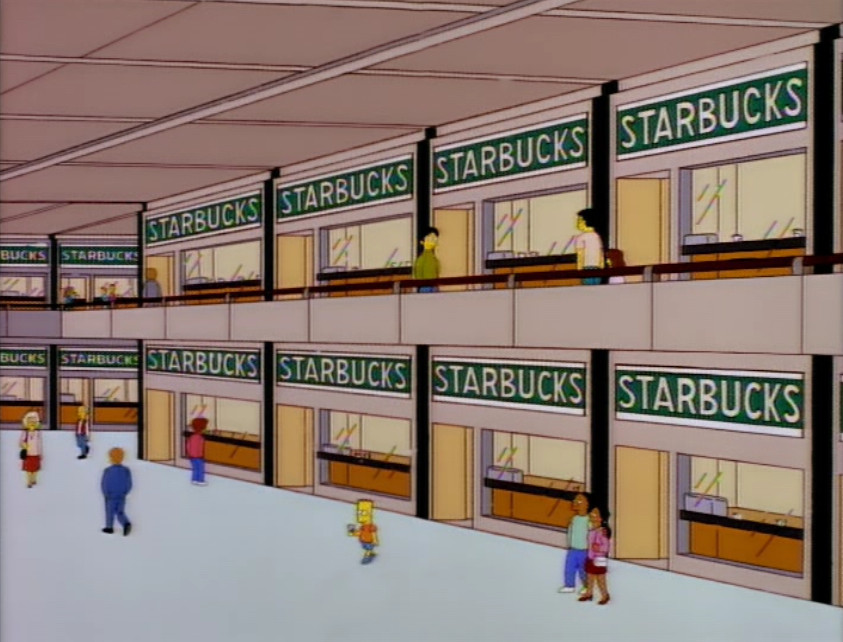Johnny Au
Senior Member
...and more McDonald's to approach the midtown Manhattan McDonald's density.And we will see a lot more Tim Hortons and Pizza Pizzas.
Oh, and more Starbucks too:

...and more McDonald's to approach the midtown Manhattan McDonald's density.And we will see a lot more Tim Hortons and Pizza Pizzas.

Out-of-town investors inflate real-estate prices and rent, study finds
Investors who buy housing and leave it empty in a city push up both real estate and rent costs, making older homeowners more wealthy and renters significantly worse off, concludes a new study by a pair of professors from Vancouver and New York.
How Toronto’s housing costs are hampering the city’s ability to attract talent
The cost of home ownership and rent is impeding young professionals' ability to save and pay down debt.
They are the young professionals the Toronto region covets — highly educated and already earning good incomes in their 20s and 30s.
They are also the canaries in the coal mine when it comes to the region's challenging housing market. If they can't afford to live here, who can?
New research from the Toronto Region Board of Trade shows the high cost of housing may be crushing the financial goals of high-achieving millennials.
A survey for the business group shows 83 per cent of young professionals believe high rents and home prices are impeding their ability to save for retirement.
Sixty-five per cent say their shelter costs are preventing them from paying down debts.
People used to move to the suburbs to save money. Now, nearly every corner of Toronto has downtown rent
In every ward of the city, from Etobicoke to Scarborough, at least 40 per cent of renters are putting 30 per cent or more of their income towards rent, a common benchmark for unaffordable housing. In Ward 23, that number is 58 per cent, according to 2016 census data.
A place slightly out of the core might save renters $10 or $20 a month “but overall the affordability crisis has basically spread to every corner of the city” with rent “eating up a huge share” of Torontonians’ disposable income, Dent said.
Dent believes Toronto needs a “tenant city” plan with billions of investment dollars to build affordable housing, adding it’s a problem that transcends an urban-suburban divide.
Officials should also look at zoning, and consider making rental-only zones in some areas, offer incentives like no property tax for the first five years on affordable buildings or just build affordable units on land that’s already publicly owned.
https://www.thestar.com/news/gta/20...very-corner-of-toronto-has-downtown-rent.htmlOtherwise, he said, soon only the very rich will be able to afford to live in the city.
“If things keep going the way they are, Toronto as we know it is done,” he said.
Well when you bring in rent controls and handcuff landlords, rent goes up. Rents were high before then Wynne pushed them even further with her stupid changes.
Well when you bring in rent controls and handcuff landlords, rent goes up. Rents were high before then Wynne pushed them even further with her stupid changes.
Neglected the the affordable housing issue just like they ignored public transit issues. An indictment on our do nothing government.
City is unaffordabke now. Average joe can’t even afford a condo.
It's definitely the equivalent of a Gordian knot. No single strand will solve this issue alone.
A toxic combination of foreign interests looking to park their monies, local homeowners/investors/property management looking to make a quick buck on the increases, and a genuine lack of supply caused by population growth and units possibly being left empty as assets.
Unfortunately, the government has no guaranteed way of resolving this beyond either capping maximum rent (goes against free market), or introducing enough low-priced supply (Vienna-izing the market) to tank rental costs. I still think that opening up the Yellow Belts of Toronto for fast conversion into multi-unit housing (within the existing built form, with possibilities of future intensification) is a good way of creating rapid supply, though there's probably no guarantee that that'll halt the increases in price.
Half (or more?) the problem is the massive waste of space that is most of Toronto: a sea of single-family homes. Blow them up and start again, he said, only half-joking.
It's a massive waste of space. Toronto, in its geographical area, could easily support a population at least three times current numbers.
It's decades of shit planning compounded with some contemporary desirability and money issues thrown in to complicate things.
Toronto's sea of single-family detached neighbourhoods needs to die.
While there are plenty of subdivisions for which I would shed no tear, I will take only a small issue w/this and say if we avoided the politics re-doing whole subdivisions and instead focused on their edges, we achieve most of the same gain at lower financial and political cost.
What's really grating is not the post-war bungalows between Victoria Park and Warden, its the post-war bungalows ON Victoria Park and Warden.
It was affordable 4 years ago. Not a few decades ago.Toronto was exceptionally affordable a few decades ago and the run-up in rental costs probably is just bringing it up to international levels relative to it’s peer group with a bit of hubris overshoot.




